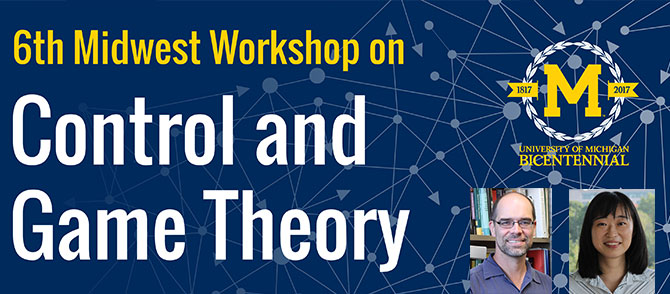Berry & Wei are Invited Speakers at 6th Midwest Workshop on Control & Game Theory
The workshop brought bring together researchers, students and faculty from the midwest region of the United States, who develop and apply game and control theory to analyze, design and assess complex systems.

Prof. Randall Berry and Prof. Ermin Wei were Invited Speakers at the 6th Midwest Workshop on Control and Game Theory, held in Ann Arbor, MI on April 22-23, 2017.
Prof. Berry presented his paper, titled, “The Sharing Economics of Wireless Spectrum” and Prof. Ermin Wei presented her paper, titled, “Superlinearly Convergent Asynchronous Distributed Network Newton Method.”
The workshop brought bring together researchers, students and faculty from the midwest region of the United States, who develop and apply game and control theory to analyze, design and assess complex systems. The workshop was a one-and-a-half-day event, which starts on April 22 and adjourns late afternoon on April 23. It comprises invited and contributed presentations.
Prof. Berry's Talk Abstract: The combination of the rising demands for wireless data and the lack of vacant spectrum to support these demands has led to a shift in focus from exclusively licensing spectrum to a single entity to sharing spectrum among multiple entities. The various entities sharing a band of spectrum may in turn compete with each other for customers. This is further complicated due to the congestible nature of the shared spectrum. In this talk we will discuss several game theoretic models for studying how different policies for sharing spectrum may impact the resulting market outcomes.
This talk is based on joint work with M. Honig, T. Nguyen, C. Liu, V. Subramanian, R. Vohra and H. Zhou.
Prof. Wei's Talk Abstract: The problem of minimizing a sum of local convex objective functions over a networked system captures many important applications and has received much attention in the distributed optimization field. Most of existing work focuses on development of fast distributed algorithms under the presence of a central clock. The only known algorithms with convergence guarantees for this setup in asynchronous setup could achieve either sublinear rate under totally asynchronous setting or linear rate under partially asynchronous setting (with bounded delay). In this work, we built upon existing literature to develop and analyze an asynchronous Newton based approach for solving a penalized version of the problem. We show that this algorithm converges almost surely and has superlinear rate in expectation. Numerical studies confirm superior performance against other existing asynchronous methods.
